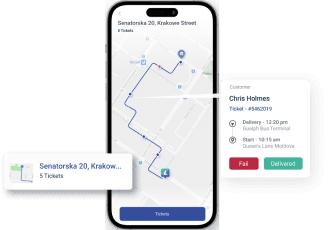TABLE OF CONTENTS

Sign-Up
Enter your email address
Telematics is the technology that combines telecommunications, informatic, and wireless devices to send, receive, and store data that is connected to the vehicle. It is a method of monitoring fleets, equipment, and other assets to plot the movement of the asset on a computerized map.
It provides a complete overview of vehicle health, profitability, and productivity. In this article, we’ll explore how various industries are advancing with the help of telematics.
How are Telematics and GPS Connected?
GPS Telematics devices collect and transmit location using GPS telematics and vehicle-specified data through cellular networks or satellite communications to a centralized server. This data is processed and stored in a user-friendly format that can be accessed by free donors via websites and apps.
The most common application of telematics is in the logistics and transportation industry, especially in commercial fleet vehicles. The data captured using telematics devices can include location, speed, engine idling, harsh braking or acceleration, fuel consumption, temperature, and vehicle faults, among other things. This enables fleet owners to effectively monitor all their vehicles collectively and individually in real-time.
Fleet management software can read this data to send alerts to fleet owners on performance issues, emergencies, and critical events like route deviations or over-speeding so that swift action can be taken. Vehicle maintenance can be improved and made predictable as sensors identify when to change oil, brake pads, or batteries.
What are the Benefits of GPS-Powered Telematics in Various Industries?
Telematics fleet management empowers transportation companies to enhance their fleet management strategies. Real-time GPS data allows for precise route optimization that saves fuel and improves delivery times.
Additionally, telematics offers maintenance reminders to avoid unexpected vehicle issues. These capabilities are essential for increasing productivity and ensuring efficient, reliable operations. In fact, positioning telematics is a vital tool for today's transportation industry.
Transportation and Logistics
Efficiency is everything in the fast-moving transportation and logistics sector. Fleet telematics enables companies to track their vehicles in real-time that ensures timely deliveries and the most efficient routes. This approach saves on fuel expenses and reduces vehicle wear. Additionally, monitoring driver behavior encourages safer driving, leading to fewer accidents and lower insurance costs. It’s about optimizing every mile to its fullest potential.
Construction
Construction fleet management can be challenging, especially when dealing with heavy equipment and vehicles. Telematics helps by providing real-time data on equipment usage, location, and maintenance needs. For example, if a bulldozer is working outside its designated area or requires prompt maintenance, fleet managers receive instant alerts. This minimizes downtime and prolongs the life of expensive machinery. Geofencing adds another layer of security by keeping equipment within the construction site, thereby reducing the risk of theft.
Agriculture
Success comes not just from hard work but from smart strategies. Telematics enables farmers to keep a close eye on their tractors and equipment. If the farmer or manager monitors field tasks such as planting and harvesting, they can refine their processes and cut down on fuel usage. Maintenance alerts help maintain equipment in optimal condition, avoiding expensive breakdowns when timing is critical. It’s all about enhancing productivity without escalating costs.
Public Transportation
Public transportation systems are the lifeblood of many cities, and telematics ensures they run smoothly. With GPS-powered tracking, buses and trains can stick to their schedules, and commuters can rely on timely service. Telematics also helps in monitoring driver behavior, ensuring safety for passengers. Moreover, real-time data allows transportation authorities to respond quickly to any disruptions, rerouting vehicles as needed. This keeps the city moving, no matter what.
Emergency Services
When it comes to emergency services, every second counts. Telematics enables dispatchers to locate the nearest available ambulance, fire truck, or police vehicle and direct them to the scene without delay. GPS tracking ensures that emergency vehicles take the quickest routes, avoiding traffic jams and saving precious time. Additionally, real-time communication with the fleet helps emergency responders stay updated on the situation, improving coordination and efficiency.
Utilities and Energy
For utilities and energy companies, managing a large fleet of service vehicles can be complex. Telematics simplifies this by providing real-time location tracking, route optimization, and vehicle diagnostics. For example, during a power outage, telematics can help dispatch the nearest service vehicle to restore power quickly. Maintenance alerts ensure that vehicles are always ready to respond to emergencies, reducing downtime and enhancing service reliability.
Waste Management
In waste management, efficient routing is crucial to minimize fuel consumption and ensure timely waste collection. Telematics provides real-time data on vehicle locations, helping managers optimize routes and schedules. This not only reduces operational costs but also lowers carbon emissions. Additionally, telematics can monitor the performance of collection vehicles, ensuring they are well-maintained and reducing the risk of breakdowns.
Mining
Mining operations often take place in remote and harsh environments, making fleet management a challenge. Telematics offers a solution by providing real-time data on equipment and vehicle locations, usage, and maintenance needs.
This helps in preventing equipment failures, which can be costly and dangerous in mining operations. Managers can also ensure that vehicles stay within designated areas, enhancing safety and security in the mine.
How Telematics Fleet Tracking Impact Driver Productivity and Satisfaction
Driver productivity and satisfaction is very important for any fleet operation. Interestingly, telematics plays a significant role in both areas by optimizing routes, reducing downtime, and providing real-time updates. Fleet tracking helps drivers to have clear, efficient routes and receive timely information, so they can perform their jobs more effectively. This not only increases the number of deliveries or services completed but also reduces stress by avoiding traffic jams and delays.
Moreover, telematics helps in monitoring driver behaviour, such as speeding or harsh braking. By providing feedback and coaching, companies can promote safer driving practices, which leads to fewer accidents and lower insurance premiums. Drivers who feel supported and recognized for their safe driving habits are more likely to be satisfied with their jobs, leading to a more motivated and productive workforce.
Final Words
In today’s digital age, fleet telematics solutions and Advanced GPS Tracking Solutions and telematics have become a game-changer across various industries. Whether it’s transportation, construction, agriculture, or emergency services. However, GPS-powered telematics offers real-time insights that drive efficiency, safety, and productivity. By embracing this technology, companies can future-proof their operations, ensuring they remain competitive and efficient in an increasingly connected world.
Telematics isn’t just about fleet tracking, it’s about transforming the way industries operate, making them smarter, safer, and more efficient. As technology continues to evolve, the benefits of telematics will only grow, making it an essential tool for any fleet-dependent industry.
So, are you ready to upgrade your fleet management with Advanced GPS Tracking Solutions? Join us and start your free trial today or book a demo to see it in action.

Aiden mitchell
As a GPS Tech geek, I find Lumyri's transformative impact on GPS technology on businesses and their customers. Real-time tracking information empowers businesses to provide accurate delivery estimates, allowing customers to plan their schedules with precision.



